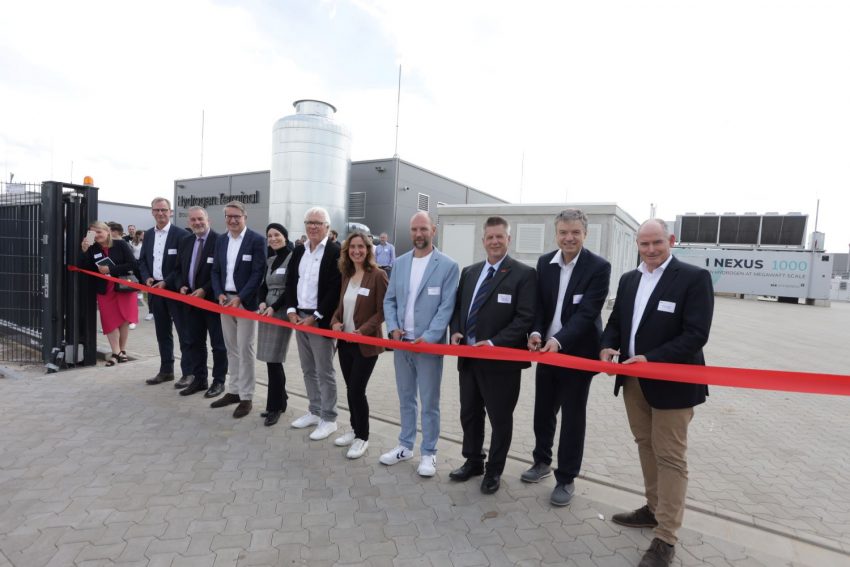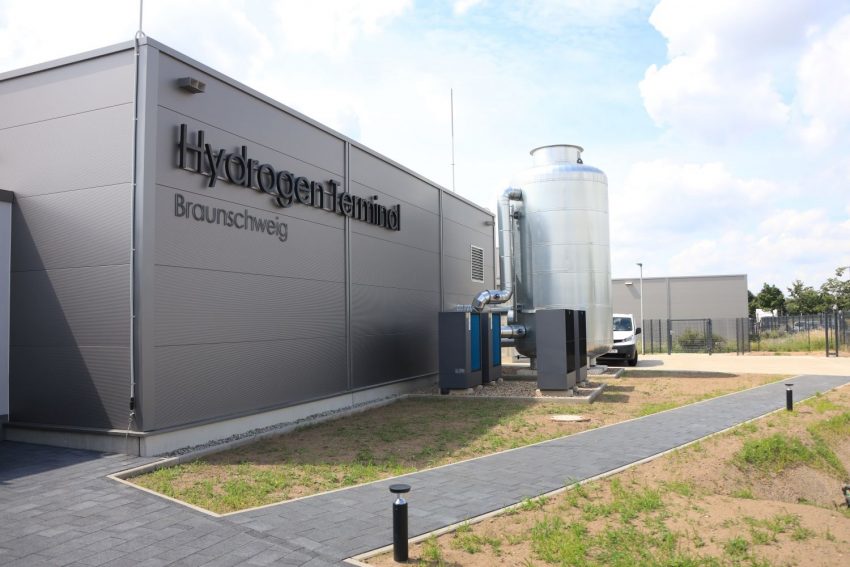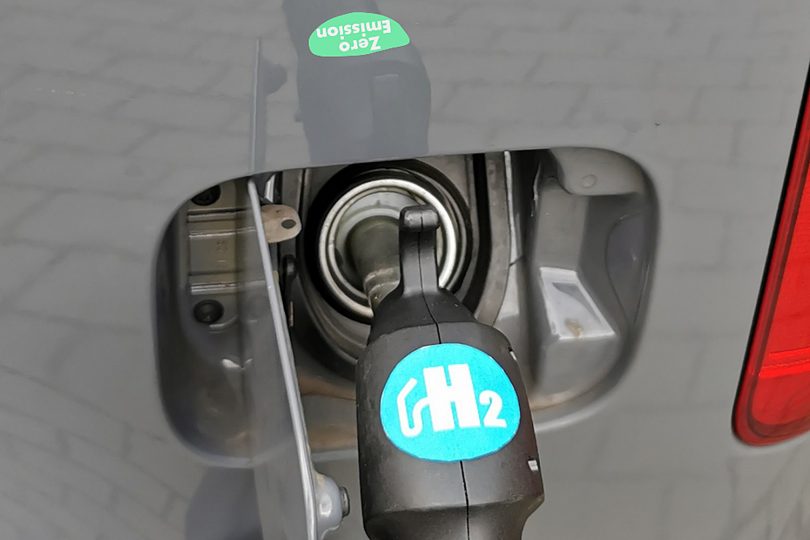Opening and open day of the Hydrogen Terminal Braunschweig Research along the hydrogen value chain
An important step for energy research in Niedersachsen and beyond: the Hydrogen Terminal Braunschweig was officially opened on Tuesday, 18 June 2024. In future, research will be carried out here along the entire process chain, from production and storage to the use of climate-neutral hydrogen. The research project is funded by the German Federal Ministry of Education and Research (BMBF) with a total of more than €20 million. The research project is being carried out as a joint project by the Steinbeis Innovation Centre energieplus (siz energieplus) and Technische Universität Braunschweig (TU Braunschweig).

Ceremonial opening of the Hydrogen Terminal: from left: Olaf Krawczyk (WMK, Investment Promotion Energy, Environment, Coast and Sea), TU Vice-President Prof. Manfred Krafczyk, Gerold Leppa (Head of Economic Affairs, City of Braunschweig), Kerstin Annassi (Project Manager Jülich), Prof. Norbert Fisch (siz energieplus), Prof. Mehtap Özaslan (Technical Electrocatalysis Laboratory), David Sauss (siz energieplus), TU Vice-President Prof. Peter Hecker, Prof. Bernd Engel (elenia Institute for High Voltage Technology and Energy Systems), TU Vice President Dietmar Smyrek. Photo credit: Sascha Gramann/ siz energieplus
The approximately 4,700 m² research and demonstration site at Gerhard-Borchers-Straße 1 at the research airport was designed by jahn architektur and built in just 15 months as a future megawatt-scale energy centre for research into the many aspects of green hydrogen.
Research to increase efficiency
At the heart of the project is Enapter’s Nexus 1000, a 1-megawatt electrolyser that is the world’s first prototype to use anion exchange membrane (AEM) technology. This will be expanded as the project progresses with an intermediate zinc electrolyser from Stoff2. In addition to the electrolysers located outside the building, electrolysis and fuel cell test benches will be set up inside the research building together with the Technical Electrocatalysis Laboratory, headed by Prof. Dr. Mehtap Özaslan and Dr. Frédéric Hasché. It will cover the different technologies of alkaline electrolysis, PEM (Proton Exchange Membrane) electrolysis and PEM fuel cells. The project will carry out fundamental research to increase the efficiency of all generation and conversion technologies. In addition, the possibility of producing hydrogen by (co-)pyrolysis of hydrocarbonaceous feedstocks will be tested and further developed as part of the research project.
Supplying green hydrogen to facilities at the research airport
The green hydrogen produced by the electrolysers using renewable electricity is used in a number of ways. On the one hand, it is used in internal test rigs to carry out ageing tests with different hydrogen qualities and to investigate material innovations. On the other hand, other facilities in the immediate vicinity, such as the Fraunhofer Project Centre for Energy Storage and Systems (Fraunhofer ZESS) and the Niedersachsen Research Centre for Automotive Engineering (NFF), are supplied with green hydrogen via a pipeline.
Hydrogen storage tested with the world’s largest metal hydride storage system
Parallel to the hydrogen supply, the Fraunhofer ZESS is also supplied with the waste heat from the electrolysis process. A high-temperature heat pump is used to raise the temperature of the waste heat from the electrolysis processes and make it available via a local heating network. Hydrogen storage is also being tested on the NFF site in what is currently the world’s largest metal hydride storage facility.
Hydrogen refuelling station for trucks
Directly at the Braunschweig Hydrogen Terminal itself, the hydrogen produced will be used to operate a Maximator hydrogen refuelling station. This allows the refuelling of heavy goods vehicles with green hydrogen at a pressure of 350 bar to be tested.
The elenia Institute for High Voltage Technology and Energy Systems at TU Braunschweig is also investigating how the electrolysers and fuel cells, together with a large battery storage system (storage capacity 1.1 megawatt hours) and the photovoltaic system (installed capacity 100 kilowatts), can be used to stabilise the electricity grid when conventional fossil fuel power stations are no longer available.
Seven TU institutes involved
TU Braunschweig is involved with seven research institutes and the Facility Management department. A total of around 15 scientists from the Steinbeis Innovation Centre energieplus and TU Braunschweig are currently working with the aim of pooling research expertise along the hydrogen efficiency chain and carrying out research into hydrogen production, storage, feed-in and distribution, as well as conversion to electricity in fuel cells.
Hydrogen Terminal Braunschweig – Open day
As part of the nationwide Hydrogen Week (#WDW2024), an open day for young and old – for professionals and amateurs – for interested and curious people will take place on Saturday, 22 June 2024, from 10 am to 6 pm.


